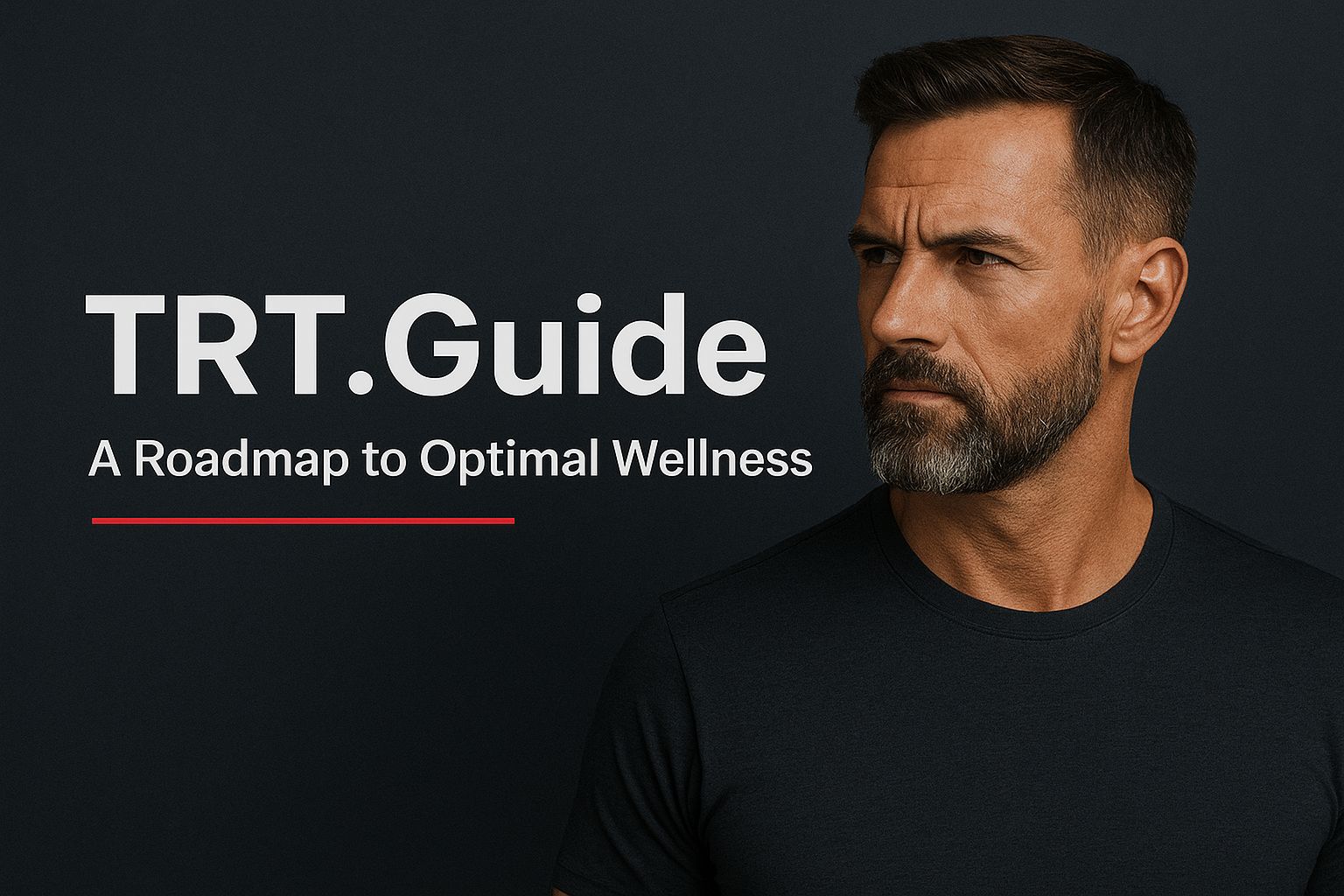Testosterone replacement therapy (TRT) has become widely used by men to improve their energy, mood, and body condition. But a lot of them are concerned about its influence on fertility, especially they wonder if TRT can decrease sperm count. In case you are contemplating this course of action or already working through it, being aware of the potential side effects on your reproductive health is very important to do.
There is evidence that the treatment of TRT is actually able to raise the level of testosterone in the blood, but also it could be the reason for the inhibition of the natural hormone secretion, which can be the cause of the decrease of sperm number. With the findings of the present article, the impact of testosterone replacement therapy on the sperm count issue, one would be able to have a better grasp of the impact of the treatment on one’s health and family planning if any.
Overview of Testosterone Replacement Therapy
A substitute or condition that can’t be born chemically means that Testosterone Replacement Therapy (TRT) is making the life of men who want to become stronger and healthier through energy levels. The chemical composition and actions of this therapy are important for the identification of its influence on fertility.
What Is Testosterone Replacement Therapy?
Testosterone replacement therapy is a treatment to give males with low levels of testosterone, typically due to age or a medical condition, synthetic testosterone. There are various delivery options, such as injections, patches, gels, and pellets among others. The therapy’s normalizing of the diminished hormone levels represents the recognition of the alleviation of problems that ensue such as weakness, low sex drive, and mood-related aspects. Checking is an important part of the treatment because, as patients’ individual responses and side effects are given, their doctors amend the dosages accordingly.
Common Medical Reasons Doctors Prescribe Testosterone Replacement Therapy
Testosterone replacement therapy is mostly used due to several health problems:
- Male hypogonadism: TRT is a form of therapy out of several treatment options that is frequently recommended for the solution of hypogonadism, which is a deficit of testosterone and may be the cause of impotence and loss of muscle.
- Sexual Dysfunction: In this regard, TRT counts as the valid option for solving the lack of sexual health and testosterone in men, it helps raise libido, aside from getting rude of ED.
- Energy Depletion and Negative Emotions: Male individuals with long-standing chronic fatigue or mental illness can achieve a better mood and increased energy levels through TRT.
- Body Composition: Reduction of adipose tissue and increase in lean muscle mass, which is a result of TRT, can have a positive impact on a person’s well-being thus help to improve body composition.
Having knowledge about these applications allows for a discussion about the use of TRT and its potential impact on sperm count and fertility.
Underlying the Sperm Production Process
Spermatozoa formation, called spermatogenesis, is a androgen-driven process guided by carefully balanced hormonal levels. With its influence, testosterone has this whole process significantly controlled; it mediates both sperm count and the general state of the semen.
The Importance of Testosterone in Sperm Production
The sperm production process is substantially affected by testosterone. It is the major hormone produced in the testes and is required in the early stages of sperm cell formation. Good testosterone levels promote proper production of sperm, but poor levels lead to an arrest in the spermatogenetic process. Testosterone is the hormone that decreases (Sertoli, the first part of the cell) and the hormone that is released by the pituitary gland that is responsible for this (HPG).
Like the power of FSH and LH over the development and the continuity of germination, the hormones in the Hypothalamic Pituitary Gonadal (HPG) axis area the male body are important because without the influence of these hormones, it would be impossible to make and keep living the cells of the testes. For this reason, maintaining constant amounts of testosterone is a critical point, not only for the productivity but the well-functioning of the sperm as well.
Factors Affecting Sperm Count
There are many natural variables that are in charge of the number of the semen, such as hormonal, certain lifestyle choices, and environmental factors. An insufficient level of testosterone, as well as a high level of estrogen, can be vividly and directly seen as causing changes in the sperm of the human body. On the other hand, lifestyle factors, for example, being overweight, smoking, and excessive alcohol intake, can cause a reduction in the quality and quantity of sperm. In addition, the toxicity effects of chemicals such as pesticides and heavy metals are the ones that are of most concern.
In other words, they can substantially harm the sperm even without any doubt. Person’s opposition to the temperature swings is eminent because it is known that tight clothes and hot baths are not at all safe. The maintenance of these issues that have a negative influence on the health of the semen can improve the sleep of sperm. However, the truth is that this is quite a challenge for men that have done the testosterone replacement therapy process for those men who plan on or already going through getting a child.
Testosterone Replacement Therapy and Sperm Count
The findings of completed research projects present the matter that the testosterone replacement therapy (TRT) has a substantial bearing on the sperm count. Perception of the clinical results aids in unraveling its significance for conception.
Clinical Research and Discoveries
A great number of the clinical studies reveal that TRT may lead to decreased sperm count. The study from the Journal of Clinical Endocrinology & Metabolism magazine portrayed that men on TRT underwent a decrease in sperm production with some experiencing 50% or more reduction. Another paper in Fertility and Sterility noted that 40% of patients who underwent TRT were with oligozoospermia, which means that their sperm concentration levels were low.
Further, TRT seemed to affect men diversely based on their age and the levels of their testosterone supplies. The lower your age is and the lower the testosterone, the more you are susceptible to a decrease in sperm count; this phenomenon was more marked in the case of younger people. These results must be put in the context of the people’s healther situation as well as the overall health of the group.
Interpreting the Findings
Interpreting the results of TRT research leads to the conclusion that while levels of testosterone go up, other factors are at play to distract from fertility. Sperm production primarily depends on a carefully balanced hormonal regulation, specifically a partnership between testosterone and luteinizing hormone (LH). Mostly, TRT may result in decreased LH levels, which in turn may suppress the normal testosterone production, thus hinder the process of spermatogenesis.
Some patients, despite temporary fertility recovery after stopping the TRT, can remain infertile for a long time. It is crucial to address hormonal changes and family planning with medical professionals to develop appropriate measures that fit the patients’ health and family goals. Comparing the advantages and potential risks of fertility in TRT is still relevant to informed health management.
A Brave New World of Testosterone Replacement Therapy
Initially, it must be said that testosterone replacement therapy (TRT) is complex for male reproductive health. Knowledge about the risks and benefits will enable you to decide if TRT is the best choice for your reproductive health.
Risks of Fertility and Its Associations
Men’s fertility and TRT are two things that cannot co-exist in peace. Lowering sperm count has indeed become one of the most threatening consequences of TRT. The research has been done that validated this claim strongly. In a number of cases, it was observed that during the TRT the sperm shall be affected seriously. This is a result of the excessive use of anabolic steroids, which, in turn, leads to the blood being so thick that it clogs the vessels.
Androgen hormones thereby inhibit the pituitary secretion of LH. The longest period of 10 days of TRT in young men caused no harm to their reproductive abilities and health. Care for the family planning program that suits the affected individuals, as the latter is mastered, denotes that the band is prepared. Thus, information and medication are provided at once in a narrow circle.
How Testosterone Replacement Therapy Helps?
TRT contributes to various physical and mental benefits, including enhanced mood, increased energy, and improved sex drive along with an increase in the levels of testosterone. Application of TRT in medical practice may bring complementary support to the main focus by improving men’s sexual life with excellent satisfaction and well-being. The use of hormone replacement therapy to manage symptoms of depression and restore physical strength will be discussed later.
The result of stable levels of cortisol and cholesterol was well-regulated energy levels as a perception of both physical and mental health. Despite the skepticism surrounding fertility, many users of the product have experienced both the physical and psychological merits and have reported subsequent improvements in their health. Let your health practitioner know your top topics, and they will make sure you have the best possible experience of the treatment.
Conclusion
Opting for Testosterone Replacement Therapy surely does give a positive turn for the quality of life but is also combined with a set of possible threats. TRT can be effective in mental improvement resulting in a person’s good spirits and new vigor of life, yet it may cause a reduction in the number of your sperm. The latter may really bother you if you still have the idea of having a child in the future.
Your healthcare provider must be your partner in the decision-making process about fertility and goal attainment. By knowing the impact the treatment has on your hormonal levels, you are able to choose the best options for sound judgment. You will be able to understand the pros and cons of each decision using this approach if you open the channels of communication and deal with the issues directly thereby attaining not only your ideal state of health but also harmonizing it with your life’s best plan.
Frequent Ask Questions
What is testosterone replacement therapy (TRT)?
TRT is the medical practice of giving male patients with testosterone levels lower than normal a course of synthetic testosterone. The most common reason for a doctor to give a prescription for TRT is the presence of diseases such as hypogonadism, sexual dysfunction, fatigue, and depression, keep the patient more vital and energetic, and improve the body composition.
How does TRT affect sperm count?
Status defines that the probability of impregnating though having TRT may significantly drop along with the sperm count. Clinically, a considerable number of publications have shown that most men using TRT have experienced a fall in sperm production, and some of them reported more than 50% reductions, because TRT leads to imbalances of the sex hormones that are necessary for the process of generating the sperm fermented in the testes.
Can TRT lead to fertility issues?
Truly, TRT is likely a path leading to infertility. Low levels of testosterone inhibit the natural production of hormones, primarily luteinizing hormone (LH), which, in fact, is the only way of formation of the spermatogenesis in men, and the end result is a reduction in the number of sperm, which is one of the main reasons for family planning failures.
Do you know whether TRT has any advantages?
Yes, TRT can be a good option as it can improve mood, make one feel more energetic, raise the sex drive and all the way up to a better general quality of life. Men who undergo TRT usually share that they observe body changes and improved mental clearness once they start the therapy.
What are the concerns that affect the production of the male’s genetic materials?
Quite a number of aspects influence sperm production level including hormonal balances, lifestyle decisions, and environmental elements. The healthy levels of testosterone and these factors working together are the best points to start and are beneficial not only to keep sperm in the right condition but also to promote fertility.
Is it necessary to have a consultation with a healthcare provider about TRT?
Definitely. It is important to talk about TRT with a healthcare provider in order to be aware of what the treatment involves and if it can help your personal case as well as to clarify any doubts of fertility problems that may arise before the therapy.






